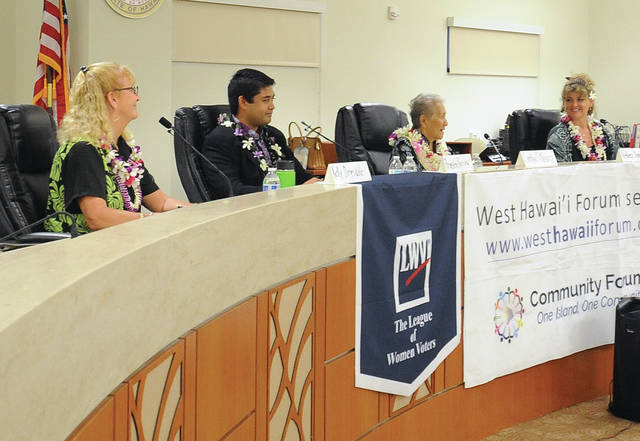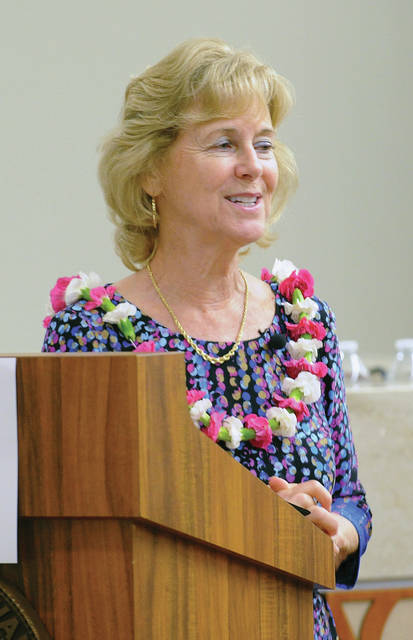Correction: A previous version of this story incorrectly stated that candidate for Hawaii County Council District 7, Bronsten Kossow, is the son of Hawaii County deputy managing director, Barbara Kossow. He is, in fact, her grandson. It is the policy of the West Hawaii Today to correct any incorrect or misleading information as soon as it is brought to the attention of the paper.
KAILUA-KONA — The race for the Hawaii County Council District 7 seat is one of the 2018 election cycle’s most hotly contested on the Big Island.
But no matter who voters from the portions of South Kona and North Kona that comprise the district choose to represent them, the seat’s next occupant will be a political newcomer. None of the four candidates to replace three-term councilman Dru Kanuha, who is running for state Senate this year, have ever served in office.
The District 7 hopefuls include Kelly Drysdale, daughter of Los Angeles Dodgers baseball player Don Drysdale and current director of logistics at the Kona Coffee and Tea Company. Then there’s Bronsten Kossow, a West Hawaii native and college student at the University of Hawaii at Hilo, who is also the grandson of Hawaii County deputy managing director, Barbara Kossow.
Also running is Cynthia Nazara, raised in Kailua-Kona and a member of several community organizations including the Hawaii Island Burial Council and the Kona Historical Society. The final candidate is Rebecca Shute-Villegas, also born and raised on Hawaii Island and who formerly worked as marketing manager for Kona Brewing Company. She also served as president of Kohanaiki Ohana for nearly a decade.
All the candidates gathered at the West Hawaii Civic Center Council Chambers Tuesday night to introduce themselves to voters and offer their bonafides for a spot on the council. Community Forums, in conjunction with the League of Women Voters, convened the public meeting.
Moderator Sherry Bracken pressed the candidates on why they’re qualified for office considering none have ever held it, and what they’ve done to prepare for the job.
Drysdale cited a diversity of work experience that includes careers in sports broadcasting as well as restaurant and property management prior to her current position at Kona Coffee and Tea Company, where she said she works regularly with county agencies.
She said she’s most proud of her time spent over the last decade trying to champion development of a regional park in West Hawaii. During that time, she said she’s worked closely with two mayoral administrations to develop nearly 200 acres for beautification purposes and to serve as a local revenue source by bringing in sports tournaments and the like to the area.
Kossow touted his experience as both a coffee farmer and a member of the game management advisory commission as just a few of the ways he’s got his “boots on the ground” and is connecting with locals to get a grassroots sense of the issues.
He said his most impressive accomplishment is rounding up county support to try and shut down the state Department of Land and Natural Resources’ practice of the aerial shooting of feral animals over Waianae Mountain Range.
Nazara said her experience across several community organizations has kept her in unusually close touch with community members of all sorts.
She added this contact has provided her a unique opportunity to educate and inform the way Hawaii Islanders think about and engage with local issues, which has been her greatest community impact.
Shute-Villegas said she’s been advocating for the ethical care of Hawaii Island since her teenage years, collaborating with business and political leaders to tackle important issues like homelessness and conservation.
She said her greatest accomplishment is the establishment of a park at Kohanaiki, also known as Pine Trees, during her time as president of the Kohanaiki Ohana, as well as her advocacy over the years leading up to the ultimate realization of the park.
New to the political scene, none of the candidates escaped the evening without showing a few jitters or coming up short on answering direct questions.
All four struggled to explain exactly how they were already qualified or could prepare themselves for the herculean task of helping to manage a county budget of more than half a billion dollars in a time of crisis on Hawaii Island.
However, each candidate did provide a clear picture of their priorities and where they’d focus their efforts during their early council days, should the voters choose to elect them.
Drysdale said homelessness and creating a regional park in West Hawaii are at the top of her list, although she has her resignations about Village 9, a controversial homeless encampment proposed by Mayor Harry Kim for a plot of land off Kealakehe Parkway.
She said her very first piece of legislation would involve bringing the Kona branch of the Hawaii County Department of Motor Vehicles up to snuff, which she believes is lagging behind other branches across the island.
“I’d like to at some point work with the Department of Finance,” Drysdale said. “I’d really like to see what we can do to possibly get the DMV in line with Hilo side.”
Kossow said his priorities would be homelessness and affordable housing, getting a handle on problems with malfunctioning deep water wells and bolstering road projects.
He supports the development of Village 9 and would push for legislation to decriminalize homeless living in their cars, a solution that, in his opinion, helps both chronic and working homeless.
“I think Village 9 is a great example of that, where we can build a parking lot and have facilities like showers and food and necessary things that every person needs,” Kossow said.
Nazara stated her primary concern for the island as sustainability. Her answer to homelessness, a point addressed by every candidate Tuesday night, would be to study why people become homeless in the first place and try and stave it off through education.
As to vacation rentals, a hot button issue on Hawaii Island, she said rentals shouldn’t be in residential zones.
“Our priority should be homes for our people,” she said. “I know it brings business in … but first thing’s first.”
Shute-Villegas said her top priorities would be homelessness, biosecurity and bolstering current projects in the county pipeline.
If elected, she said her first legislation would be a push to make it easier for people to install gray water systems. Her comments came in light of the county’s mandate to do away with more than 50,000 cesspools by 2050 and the problems that poses for residents, as switching to septic tanks is a costly solution that doesn’t produce measurably better results.
“I think that there’s an opportunity that it would reduce our water consumption, so it would be like the water conservation legislation,” Shute-Villegas said. “I’ve listened to a lot of people talk about fears and a bit of anger at the thought of having to spend $15,000-$30,000 to transition their cesspool to a septic tank.”





